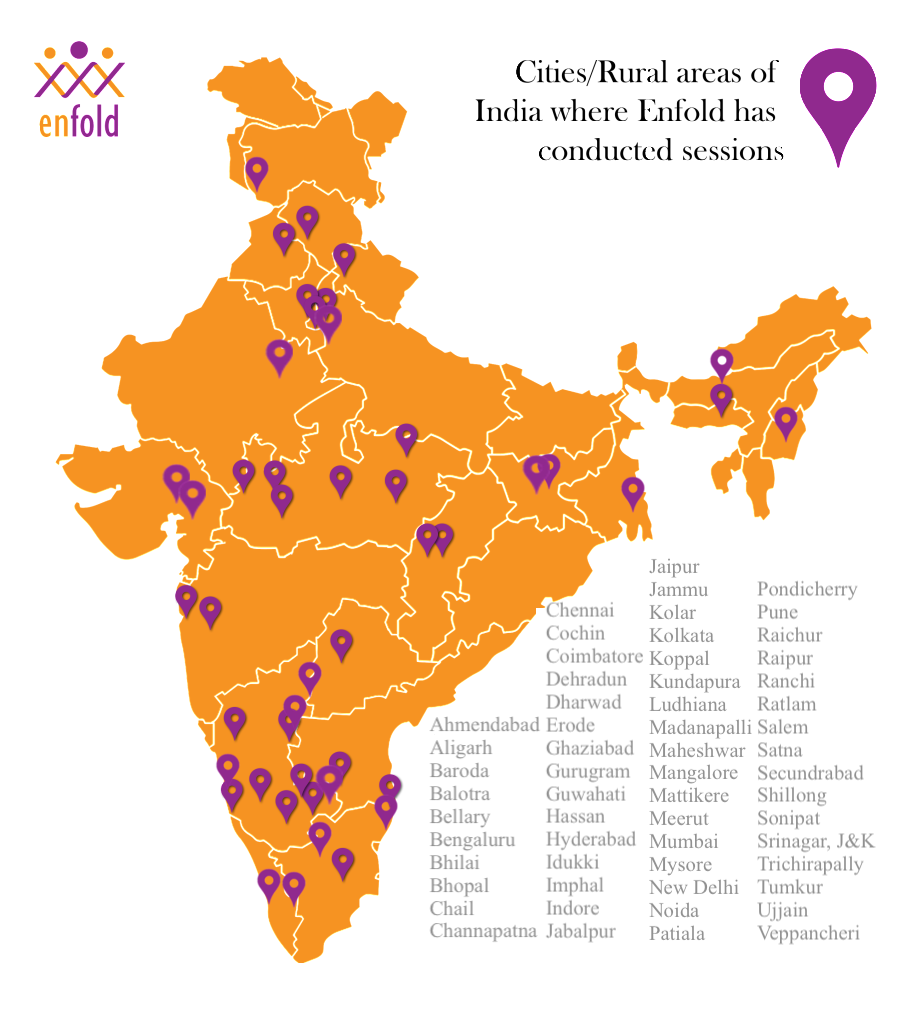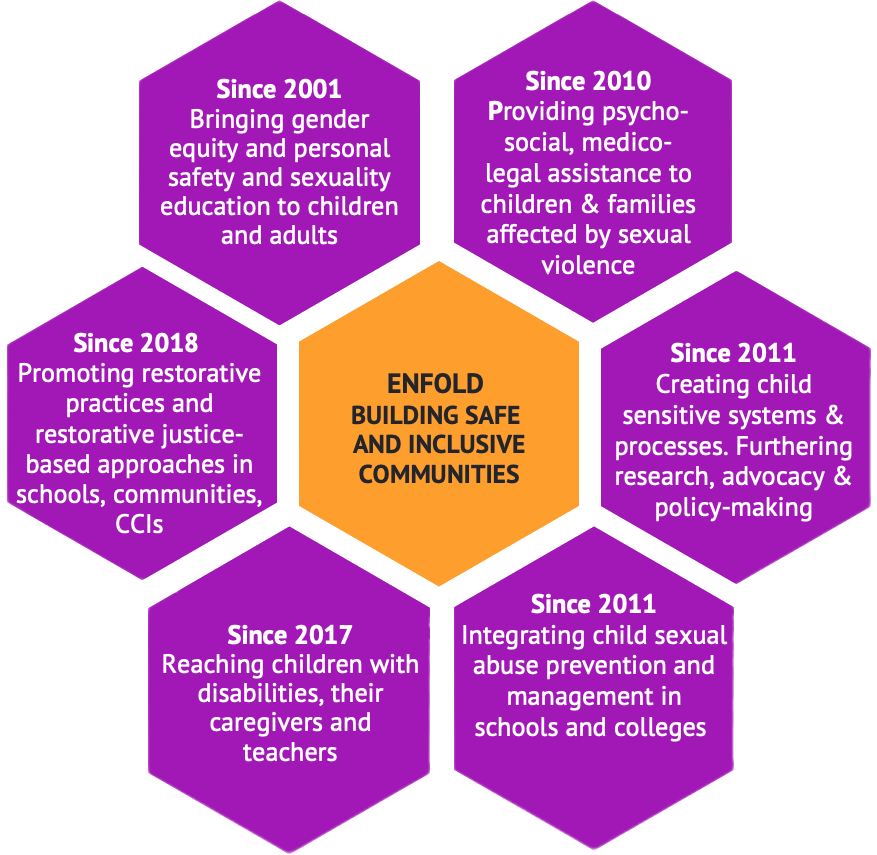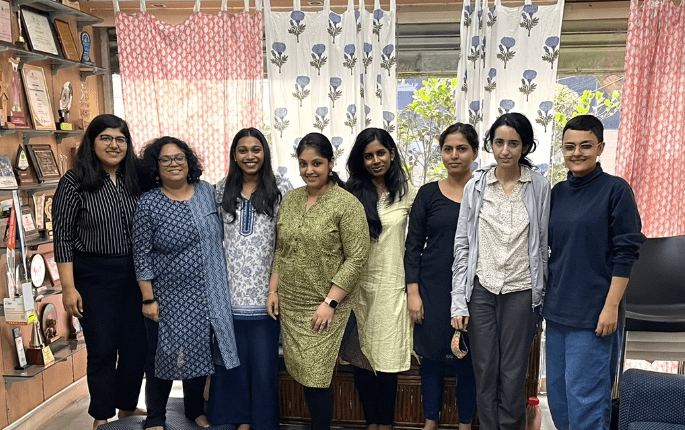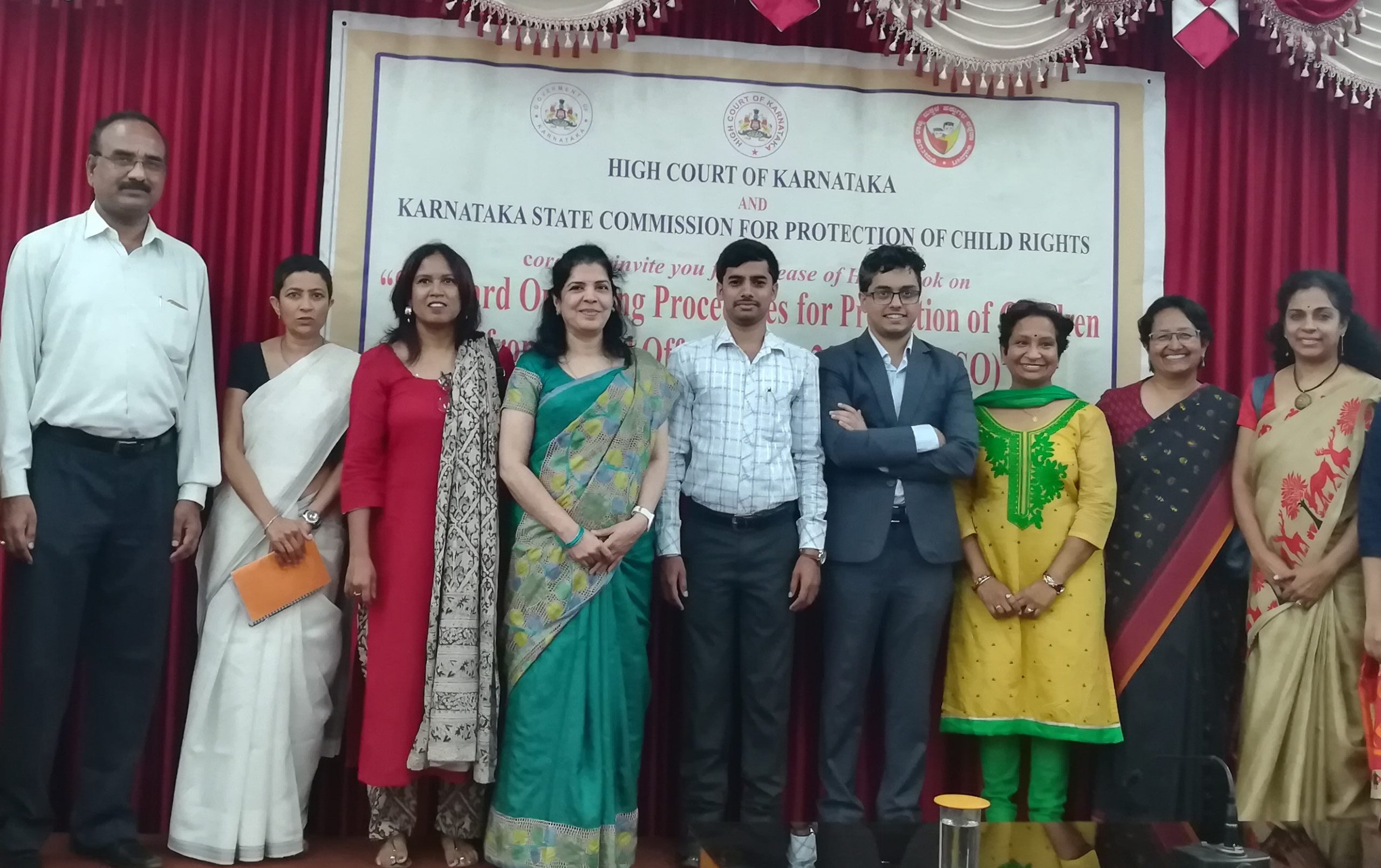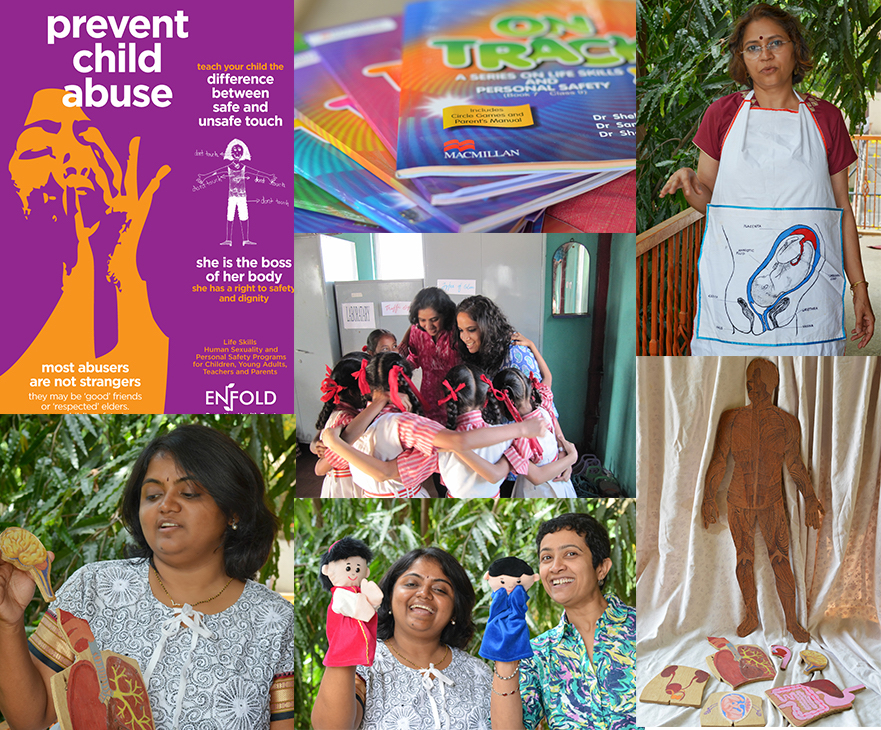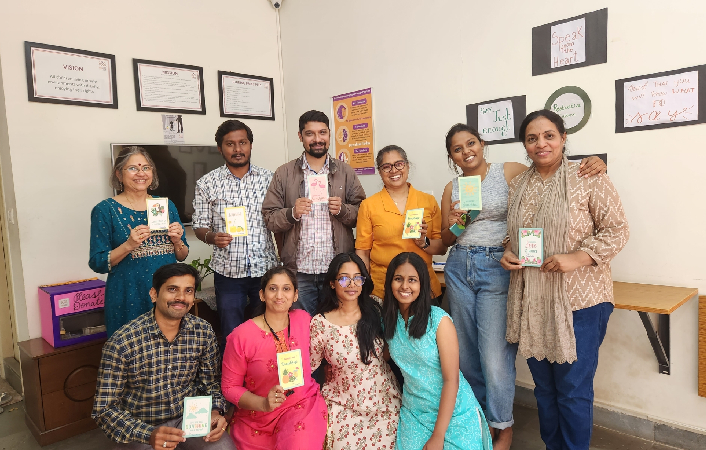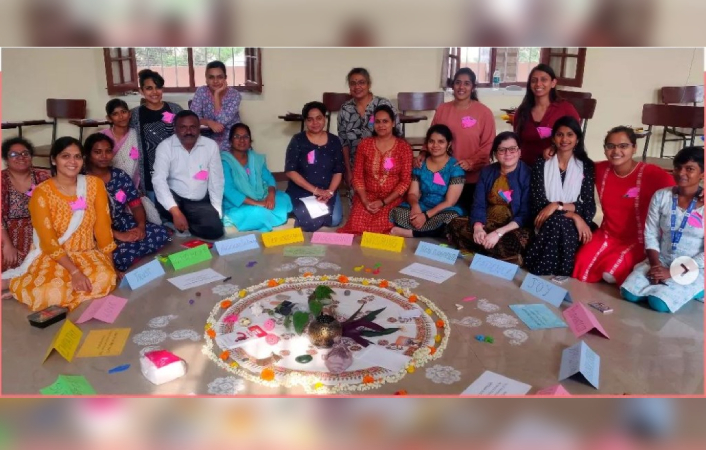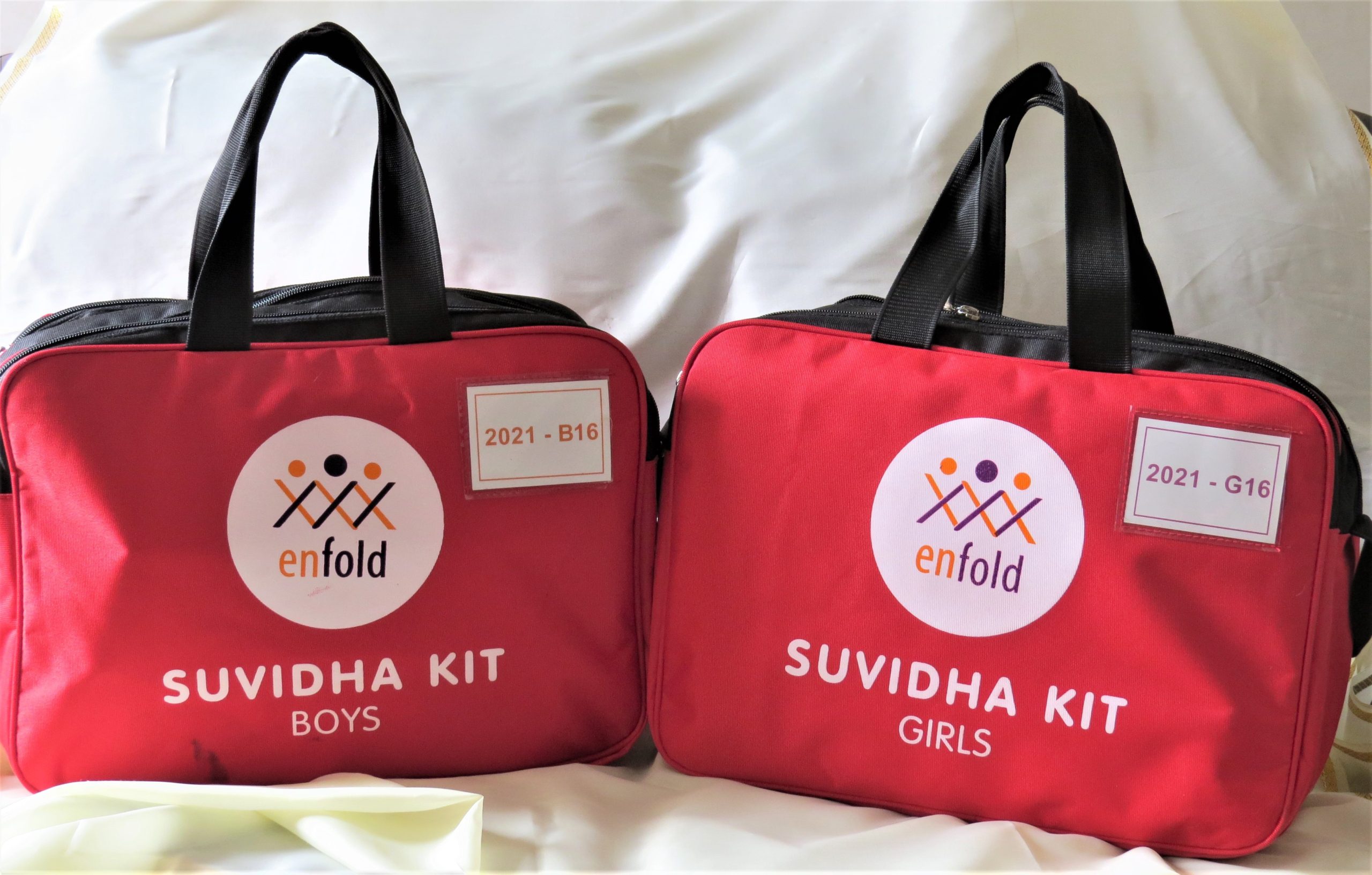Children/Young Adults Reached in 998 Schools, Colleges, CCIs
Parents, Teachers, Support Staff, Corporate Staff Sensitized (including 4,450 adults reached under Enfold’s Suvidha Project for persons with disability)
Police, Medical, Judicial, Media Personnel Trained
Counsellors, Social Workers Empowered
CCI Staff, JJB Members, Govt. Officials Worked With
Adults with disabilities reached through the Suvidha Project
Enfold’s 360 degree Pan India Strategy
- Build capacity of adults: conduct sessions for all adult stakeholders- school staff, parents, police force, counsellors, medical personnel, social workers, judiciary and the media – on prevention and management of sexual violence, and their roles and responsibilities under the POCSO Act
- Help children and youth equip themselves with survival techniques in a rapidly changing and globalized society through life skills based sexuality and personal safety education. We engage with students from grade 1 through 12 and colleges for self-empowerment, gender equality and prevention of abuse, especially child sexual abuse.
- Strengthen Systems, Policies, Implementation: We work extensively with the government and other agencies to create gender equality and strengthen or set up child friendly systems to respond to sexual violence efficiently and empathetically.
Enfold Strengths
Scientific Knowledge and Clinical Experience
As medical practitioners with 40 years of combined experience we have an in-depth, practical and authentic knowledge of all aspects of health care. We stay up to date with recent advances – especially in the field of preventive and social medicine.
Communication and Counseling Skills
We have under gone extensive formal and informal training in this field. Our deep respect and regard for children as well as our zest for life help us build rapport with children of all ages.
Formal Training in Child Psychology and Child Development
Meena Sivaraman, MSc in child development helped design the curriculum for the primary years school children. We included input from Dr Shekhar Seshadri, child psychiatrist, NIMHANS Bangalore and other mental health professionals while designing the course.
Scientifically Designed Curriculum
The sessions for the course on Human Sexuality and Life Skills were?designed from scratch keeping in mind the Indian psyche and prevailing social milieu. It is constantly reviewed and altered as our experience grows with our continued interaction with children, teachers and parents.
Research and Development
The results of our studies conducted in schools have been published in the Indian Journal of Pediatrics, the SCIISc and in international conferences. Charts and models used during the sessions were designed and developed in house. We designed innovative role plays to facilitate learning.
Imparting Knowledge
Conferences
- Delhi Government invited Dr Sangeeta to deliver a session on Awareness and Prevention of Child Abuse, Safety Issues including security check list for 1100 Heads of Schools during the The Administrative Capacity Building Program for Head of Schools of Delhi Government, on 10th January 2018 at Vigyan Bhawan New Delhi.
- Dr Sangeeta Saksena and Ms Renu Singh presented a paper on Creating Material for Inclusive Education in Personal Safety and Sexuality Etiquette – Focus on Children with Intellectual Developmental Delay at the International Conference on Inclusive Education at TISS, Mumbai on 22- 24th January 2018
- Dr Sangeeta Saksena presented a paper on Inclusive Education in Personal Safety and Sexuality Etiquette for Children with Intellectual Disability – Challenges and Way Forward” at the National Conference on Learning Together – Inclusive Schooling – in Delhi on 2-4th November 2017.
- Dr Sangeeta Saksena was the first author of the paper on ‘Creating a Toolkit to help Children with Intellectual Disability Learn Personal Safety and Sexuality Etiquette – a firsthand experience presented at the National Conference on Inclusive Education 23-25 January, 2017 at the Tata Institute of Social Sciences, Mumbai
- Dr Shaibya Saldanha was invited to speak on Child Sexual Abuse in India & Child Protection Initiative at Inauguration of child & adolescent guidance clinic(CAGC)on 9th Oct 2014 at JSS Hospital
- Dr Shaibya Saldanha shared Enfold’s journey in setting up hospital-based collaborative child response units (CCRUs) in Bangalore at the first Annual Stakeholders Conference on Child Sexual Abuse(ASCCSA 2014), 16-17th April 2014, Mumbai organised by The Foundation.
- Enfold organised a Senior Level Consultation on Systemic Response in the management of child abuse cases in Karnataka on Sept 7th, 2013. Breaking the Silence – Child Abuse in India 2013 a report brought out by Human Rights Watch was presented in this symposium.
- Dr Shaibya was invited to speak on Life Skills education at the Pearson Schools Principals Meet 4 May 2013 in Hyderabad
- Dr Shaibya Saldanha spoke on Child Sexual Abuse: Medical Evaluation & Management at PEDICON 2013 Annual National Conference of the Indian Academy of Pediatrics held at Kolkata on January 18,2013.
- Dr Sangeeta was Invited to participate in a national level roundtable on Prevention of Child sexual Abuse organized by Observer Research Foundation in association with Savitribai Phule Gender Resource Centre on 22nd December 2012 in Mumbai.
- Where the shoe pinches: An undergraduate peer sexuality education program on sexuality and life skills Dr Shaibya Saldanha and Dr Sangeeta Saksena. Paper presented at 9th ISPCAN Asia Pacific Conference on Child Abuse & Neglect (APCCAN 2011)New Delhi, India October 6 – 9, 2011
- Can School Workbooks Be An Effective Methodology For Personal Safety Education Aimed At Prevention Of Child Sexual Abuse? Our Experience With On Track – A Workbook Series For 3rd To 9th Standard Students. Dr Sangeeta Saksena and Dr Shaibya Saldanha – Paper presented at 9th ISPCAN Asia Pacific Conference on Child Abuse & Neglect (APCCAN 2011)New Delhi, India October 6 – 9, 2011
- Developing Human Capital Can a workbook on Life Skills change attitudes and behaviour of school children Sharing feedback from 217 student users of On Track workbook series – Dr Sangeeta Saksena and Dr Shaibya Saldanha. Paper presented at Rajiv Gandhi National Institute for Youth Development in Sriperumbadur, TN international conference on Life Skills Education, DEC 2010.
- The sacredness of marriage and family in a multi religious context. Paper presented on Human Life International 11th Asia Pacific Congress on Love, Life and Family,Bangalore, India, 12th – 15th November 2004
Restorative Justice Workshops – Organised by Enfold India
- Training on Facilitating Life Skills through Restorative Circles, 20-25 May 2019 for Innisfree House School, Bangalore
- Restorative Justice Approaches in Education, 1-3 May 2019, Bangalore
- Harm Circle Training by Sujatha Baliga, 17-19 January 2019, Bangalore
- Workshop on Restorative Approaches and Practices, 1-3 November 2018, Bangalore
- Workshop on Restorative Practices and Circle Process by Kushi Kushalappa & Swagata Raha, 1-3 June 2018, Bangalore
This workshop was conducted by Dr. Sangeeta Saksena, Arlene Manoharan, and Swagata Raha for 15 teachers and counsellors of Innisfree House School. During the workshop, participants experienced Restorative Circles and learnt about the concept of Restorative Justice in Education and its linkages with life skills education. Participants also got an opportunity to practice facilitation of Restorative Circles based on life skills.
This workshop was conducted by Arlene Manoharan, Child Protection Specialist and Dr. Sangeeta Saksena, Co-founder Enfold Proactive Health Trust. It was attended by 22 participants, comprising counsellors of Swasthi, facilitators from Enfold, and individuals working with children. The workshop focused on the concept of Restorative Justice, understanding the role of Restorative Approaches in school settings, and experiencing facilitation of life skills through Restorative Circle process.
A Harm Circle Training was organised by Enfold Proactive Health Trust from 17-19 January 2019 in Bangalore. The training was imparted by sujatha baliga [4], Restorative Justice Project, Impact Justice, Oakland, California. sujatha earned her A.B. from Harvard and Radcliffe Colleges and her J.D. from the University of Pennsylvania . Today, sujatha is the director of the Restorative Justice Project at Impact Justice, where she assists communities in implementing restorative justice alternatives to juvenile detention and zero-tolerance school discipline policies. The training was attended by 22 participants representing organisations working on restorative justice and with children in conflict with law, survivors of child sexual abuse, and donor agencies from Delhi, Maharashtra, West Bengal, Chhattisgarh, Jharkhand, Mumbai, Kolkata, Pune, Raipur, and Nepal. Participants also included individuals working within the juvenile justice system as well as on child rights.
This workshop was attended by 21 people across India using or planning to use RJ based circle process with children, families and stakeholders in Observation Home and Children’s Home in the Indian context. Two experts oriented participants to different types of restorative circles. On 1 November, some participants shared their experiences of facilitating restorative processes, the learnings and insights that emerged, as well as questions about the practice, the meaning of “restorative justice”, feasibility, challenges and any other concerns.
On 2 November, L’aura Joy, a Certified Trainer in Nonviolent Communication (CNVC, USA) based in Auroville, and working in the fields of communication, conflict resolution, peace and justice, healing, and decision-making and leadership introduced the participants to Restorative Circles. On 3 November, Sachi Maniar, Founder Director Ashiyana Foundation, shared her experience of using circles in the Observation Home in Mumbai and introduced participants to the circle process.
With a view to explore the possibilities of applying restorative processes within schools, an experiential workshop was offered by Enfold to facilitators working with children and adults in schools and other settings. The workshop was attended by 26 people and served as an introduction to the concept of restorative justice and circle process.

